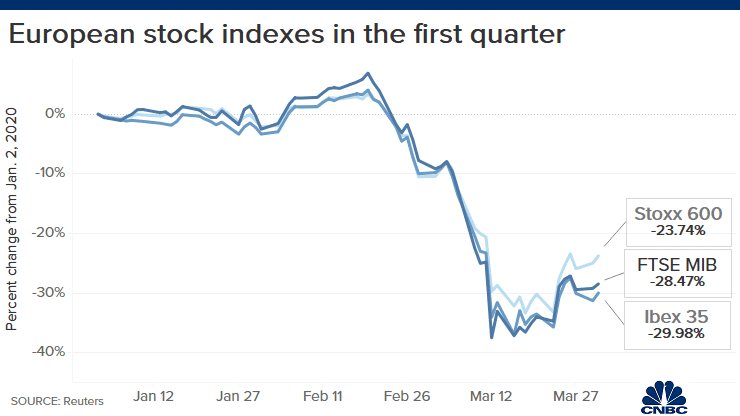
European markets have posted their worst quarter since 2002 as the coronavirus pandemic, and the nationwide shutdowns it has necessitated, hammer the global economy.
By Tuesday's close, the pan-European Stoxx 600 index had fallen by 23.03% since the turn of the year, its worst first quarter on record but narrowly beating the 23.33% loss posted in the third quarter of 2002.
Spain's IBEX 35 experienced the biggest plunge of all the major European indexes, shedding 28.94% to post its worst-ever quarter. Italy's FTSE MIB also had its worst overall quarter on record, tumbling 27.46%.
It is no coincidence that these are the two European countries hit hardest by the coronavirus outbreak. Confirmed cases in Italy now exceed 105,000 with more than 12,400 deaths, while Spain has confirmed more than 95,000 cases and more than 8,400 deaths, according to Johns Hopkins University.
France's CAC 40 plummeted 26.46% in the first quarter, while Britain's FTSE 100 and Germany's DAX dropped 24.8% and 25% respectively.
In the U.S., meanwhile, the Dow and S&P 500 on Tuesday closed out their worst first-quarter performances ever, dropping 23.2 and 20%, respectively. The Dow also posted its worst overall quarter since 1987 while the S&P 500 notched up its biggest quarterly loss since 2008.
Into the unknown
Governments and central banks in Europe and countries around the globe have thrown the proverbial monetary and fiscal kitchen sink at shoring up their economies in recent weeks.
The European Central Bank (ECB) most recently deployed a 750 billion euro ($823 billion) "Pandemic Emergency Purchase Programme" in a bid to combat the economic damage, while governments in Germany, France and the U.K. among others have turned on the fiscal-spending taps.
Investors will be watching closely to see whether the stimulus measures are having the desired economic effect in the region that has become the epicenter of the outbreak. They will also keeping an eye on any indication of the pandemic slowing, although that looks some way off with the death toll on the continent accelerating sharply on Monday.
"As we have repeatedly noted, monetary and fiscal stimulus may not be enough to revive global growth if nations around the globe stay in a lockdown mode for a few more months," said Charalambos Pissouros, senior market analyst at JFD Group.
"Thus, when this is reflected in economic data, investors may once again abandon risk-linked assets in favor of the safe-havens. In order to change our view, a vaccine has to be ready for distribution, and the vaccine in this case is not fiscal spending, neither monetary policy easing."
'Bad to less bad'
Purely fundamental investors could be whipsawed by continuing market volatility, according to Fidelity International Equities Portfolio Manager Amit Lodha, although he said there were some opportunities to be had.
"Medium- to long-term, when the picture stabilizes, we may find ourselves in an environment similar to that in 2009," Lodha said in a note Tuesday.
"In that recovery, the best thing to do was to sell everything that had been defensive in 2008 — good quality companies with low leverage — and buy everything cyclical that had survived."
Lodha suggested that an investor with a three-to-five year horizon may consider looking for cyclical businesses at distressed valuations in anticipation of this stabilization. Cyclical businesses are those whose success is closely tied to the economy, and are therefore likely to fluctuate in accordance with economic cycles.
He also flagged a possible repeat of the Marshall Plan — a U.S. initiative designed to help resuscitate the European economy after the Second World War. Lodha anticipated that a number of major economies will have to deploy their own "Marshall Plans" in order to begin rebuilding.
"The $15 billion promised (by the U.S. in 1948) for the reconstruction of Europe under the plan was about 5% of U.S. GDP (gross domestic product). Given the pace of recent announcements, I would not be surprised if we reach similar levels, around 2-5% of GDP in terms of fiscal stimulus, before the effects of the coronavirus pandemic pass," Lodha projected.
"To repeat what could be described as one of the core tenets of my colleague Anthony Bolton's investment philosophy: 'The most money in equity markets is made when things go from bad to less bad'," he added.
"Here" - Google News
April 01, 2020 at 02:49PM
https://ift.tt/2Uw21HQ
European stocks post their worst quarter since 2002: Here's what to expect now - CNBC
"Here" - Google News
https://ift.tt/39D7kKR
Shoes Man Tutorial
Pos News Update
Meme Update
Korean Entertainment News
Japan News Update
:no_upscale()/cdn.vox-cdn.com/uploads/chorus_asset/file/25244079/4.png)
No comments:
Post a Comment